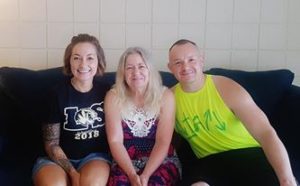
Anytime I have unrealistic expectations for something or someone, I am solely responsible for letting myself down.
This is what I have done with the idea of “Family Recovery” that I formed in my head for the better part of the last decade.
My picturesque vision of family recovery resembled those stock photos slathered on so many treatment center websites: A large family of white people, all wearing variations of crisp, white shirts and denim pants to complete their ensemble; everyone is smiling wide, showing their ridiculously white teeth, leaning in close to one another, illustrating the mended relationships, proving to us that reconciliation after years of betrayal, broken trust, maladaptive thinking and behavior, and the basic relational fuckery across the board fueled by substance use, abuse, and addiction, is actually possible if you are willing to believe in that sort of thing.
What I have learned about family recovery is that it doesn’t look anything like the vision I pieced together in my head, but here’s what I know so far:
1) There are no restraints when we are defining “Family Recovery.”
2) You don’t actually have to wear matching outfits.
3) Not everyone will be smiling from ear to ear.
4) Most people don’t want you to touch them, not even long enough to take a posed photo.
5) Repaired relationships cannot be captured in a single snapshot. This shit takes time; sometimes years.
6) Similar to our individual recoveries, there is no restoring anything to its former state.
Relationships are restored, but they are best if made from scratch. Much like the relationship we build with ourselves in recovery, we are starting all over, continuing with only few slithers of what was worth salvaging from before, if anything.
7) Everyone has a different idea of what their personal recovery should look like. We are all working on personal wellness first, in our own way. This benefits us as a whole and we are learning to redefine what it means for us to respect boundaries and approaches to living everyday life.
8) Reconciliation is a powerful antidote to stigma and our own feelings of hopelessness and disconnect within our family. This doesn’t mean we will look or act like a normally functioning, All-American family. What it means is that we are doing things we’ve never done before. We are simply striving to do better than we have all done for the last 30+ years. We are trying something new because the old way doesn’t work.
9) Beyond generic cynicism and well-timed sarcasm, we have no idea what to say to each other. When we are all sitting in the same room it becomes clear that we are uncomfortable. So far, our visits happen once every month or so. There is a lot of dead air time. Awkward silences. Nervous energy interrupted by laughter and clouded memories of our past. Without police intervention or various substances to aid in our social hours, we are really don’t know how to interact but at least we are having fun.
I am committed to continuing sharing my family’s experience to shed light on Family Recovery, without shame. It is important that people see the real faces of people who are rebuilding. It is important for others to know that sometimes rebuilding doesn’t look exactly like we imagined it would. If you’re anything like me, you never dreamed that repairing these relationships would be an option. There were times I didn’t know if I would be alive for this, or if my brother or mother would survive. Other families need to see that this whole process is imperfect; it’s not linear. Nothing about this is textbook. It’s rough around the edges, things are constantly changing, BUT it is possible. THAT is where WE FIND HOPE. When we think it’s over, it’s not always over.
It has taken my family decades to consider that we might not be treating each other well. Hell, we weren’t treating ourselves well. We have all been stuck in these sticky, sick cycles of severe dysfunction. The clean up is not going to be fast or easy, but the point is that CLEAN UP IS POSSIBLE.
We do what everyone in recovery does: We start exactly where we are with what we have.
One day at a time, one unbelievably awkward visit at a time.